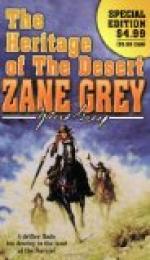Hare pondered over Naab’s words while he ate. The suggestion in them, implying a relation to his future, made him wonder if the good Mormon intended to take him to his desert home. He hoped so, and warmed anew to this friend. But he had no enthusiasm for himself; his future seemed hopeless.
Naab was waiting for him on the porch, and drew him away from the cottage down the path toward the gate.
“I want you to go home with me.”
“You’re kind—I’m only a sort of beggar—I’ve no strength left to work my way. I’ll go—though it’s only to die.”
“I haven’t the gift of revelation—yet somehow I see that you won’t die of this illness. You will come home with me. It’s a beautiful place, my Navajo oasis. The Indians call it the Garden of Eschtah. If you can get well anywhere it’ll be there.”
“I’ll go but I ought not. What can I do for you?
“No man can ever tell what he may do for another. The time may come— well, John, is it settled?” He offered his huge broad hand.
“It’s settled—I—” Hare faltered as he put his hand in Naab’s. The Mormon’s grip straightened his frame and braced him. Strength and simplicity flowed from the giant’s toil-hardened palm. Hare swallowed his thanks along with his emotion, and for what he had intended to say he substituted: “No one ever called me John. I don’t know the name. Call me Jack.”
“Very well, Jack, and now let’s see. You’ll need some things from the store. Can you come with me? It’s not far.”
“Surely. And now what I need most is a razor to scrape the alkali and stubble off my face.”
The wide street, bordered by cottages peeping out of green and white orchards, stretched in a straight line to the base of the ascent which led up to the Pink Cliffs. A green square enclosed a gray church, a school-house and public hall. Farther down the main thoroughfare were several weather-boarded whitewashed stores. Two dusty men were riding along, one on each side of the wildest, most vicious little horse Hare had ever seen. It reared and bucked and kicked, trying to escape from two lassoes. In front of the largest store were a number of mustangs all standing free, with bridles thrown over their heads and trailing on the ground. The loungers leaning against the railing and about the doors were lank brown men very like Naab’s sons. Some wore sheepskin “chaps,” some blue overalls; all wore boots and spurs, wide soft hats, and in their belts, far to the back, hung large Colt’s revolvers.
“We’ll buy what you need, just as if you expected to ride the ranges for me to-morrow,” said Naab. “The first thing we ask a new man is, can he ride? Next, can he shoot?”
“I could ride before I got so weak. I’ve never handled a revolver, but I can shoot a rifle. Never shot at anything except targets, and it seemed to come natural for me to hit them.”




